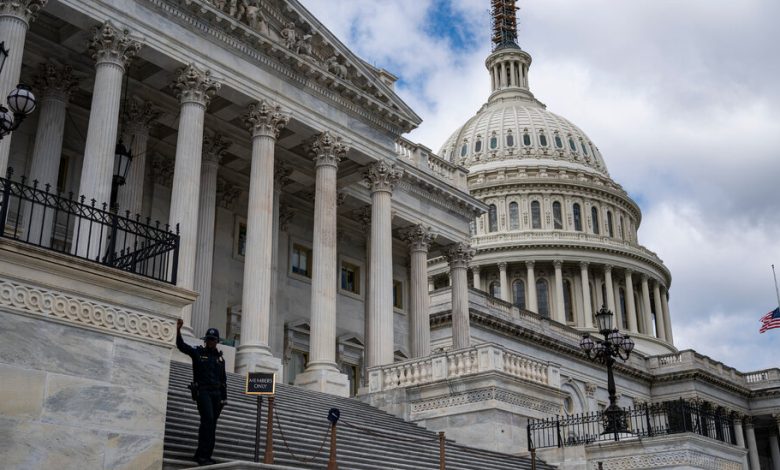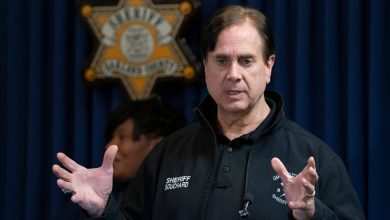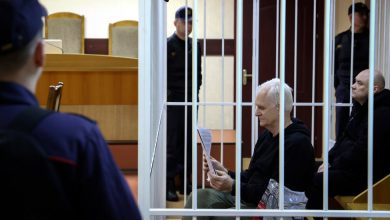To Many Americans, Government Dysfunction Is the New Normal

As the nation’s capital seemed to be barreling toward another debilitating federal government shutdown this weekend, America, well, did not exactly seem to be on the edge of its collective seat.
Judging by Google search trends, at least, Americans in the days leading up to the shutdown-that-wasn’t were more curious about who shot Tupac Shakur, who might win “The Golden Bachelor” and who would claim the giant Powerball jackpot. Even National Coffee Day 2023 generated more searches at one point than the possible government shutdown.
Those are probably not signs of public confidence that the nation’s leaders would somehow avoid plummeting off the cliff at the last minute, even though, surprisingly, they did. Instead, they may indicate that America at this point assumes that Washington actually will go over the cliff, because that is what Washington does these days. After all, the 11th-hour congressional deal that kept the government open lasts only until mid-November.
America, it seems, has come to expect crisis. In an era of disruption and polarization and insurrection, with a former president facing 91 felony counts in four criminal indictments and a sitting president facing an impeachment inquiry and a House speaker facing a possible move to oust him, the country has grown accustomed to chaos in the capital. Dysfunction is the new normal.
“For the average American outside the Beltway, these hiatuses of governing are looked at as nothing new, unfortunately,” said G. William Hoagland, who spent 33 years in the federal government, most of it as a senior budget official for Senate Republicans.
Government shutdowns are a modern phenomenon, and a measure of how fractious the capital has become. While Congress occasionally failed to pass spending bills on time in the past, it did not result in wholesale closures until President Jimmy Carter’s attorney general ruled in 1980 and 1981 that without congressional appropriations, nonessential functions had to cease. That took place several times under Presidents Ronald Reagan and George H.W. Bush, but often for just a few hours or days or over a weekend, when it was hardly noticed.
The seismic change came in late 1995 and early 1996, when House Republicans set off back-to-back shutdowns during a budget fight with President Bill Clinton, resulting in a popular backlash that made such tactics politically radioactive for nearly 18 years. Since 2013, however, Presidents Barack Obama, Donald J. Trump and Biden, it seems likely, have all confronted the threat of multiday shutdowns, making them seem almost routine.
“That is a big part of the problem,” said former Senator Claire McCaskill, Democrat of Missouri. “Dysfunction and chaos are now in the political bloodstream, and therefore folks aren’t calling or emailing D.C.” to register objections with their representatives. “They see this as part of normal, polarized, partisan politics in Washington.”
What made this prospective shutdown different from those that came before was that it was less a fight between Democrats and Republicans than a fight between Republicans and Republicans. Speaker Kevin McCarthy lost control of his narrow majority and was pressed toward a shutdown by a handful of hard-liners who defied him, forcing him to turn to Democrats to avoid it.
In the days leading up to the Saturday midnight deadline, Mr. Biden’s White House tried to stir up public opposition to what it dubbed the “Extreme Republican Shutdown” by blitzing out a string of statements emphasizing the consequences: how it would cut off food assistance for impoverished parents, hinder efforts to fight fentanyl trafficking, delay disaster recovery and suspend paychecks for troops.
Yet as absorbed as Washington was by the game of political chicken, there has not been much of a popular uprising or even much complaining from the elites on Wall Street, who normally worry that a government shutdown could damage the economy. The financial markets shrugged off the threat. The Dow Jones industrial average closed on Friday 1.3 percent down for the week, while the S&P 500 was down about half of that.
The only way that might change, according to political veterans, is if a shutdown lasted for a prolonged period of time, suspending food assistance for millions of low-income mothers and children, closing national parks, delaying air travel and forcing more than three million civilian and military government workers to go without pay. “It will take an extended shutdown, when people really begin to feel pain, to see the political blowback on the Republican House members that are playing this irresponsible game,” said Ms. McCaskill.
Former Representative Carlos Curbelo, Republican of Florida, said “a small minority” of his party had no problem trying “to wreak havoc on the institution” and would continue to do so unless there was a political price to be paid.
“Financial markets and most Americans have become numb to the drama; however, swing voters tend to punish these unnecessary spectacles,” he said.
A survey by Monmouth University showed that voters, by a 2 to 1 margin, preferred their representatives to compromise rather than stick to principles if that led to a shutdown. But even though this weekend’s showdown was precipitated by a small cadre of far-right House Republicans, it was not clear from polls who would be held accountable.
Another survey, by YouGov this past week, showed that 29 percent of Americans blamed House Republicans for the standoff, compared with 14 percent who pinned the blame on House Democrats and 13 percent who named Mr. Biden — in other words, almost evenly split between both parties. Nearly a third considered everyone equally at fault.
“When you ask the American public if they want compromise, they say yes,” said Patrick Murray, director of the Monmouth poll. “But when you ask them who they will vote for,” he continued, they stand by their party, believing that it’s the other side that isn’t compromising.
David McLennan, a political science professor at Meredith College in Raleigh, N.C., and director of the university’s poll, said the cascade of once-rare eruptions in Washington — shutdown, impeachment, criminal trials, internal revolt — had fed into a broader sense of disenchantment with the direction of the country that has seeped down to the state level. He calls it a “contagion effect.”
“There is no demographic group where the majority of people think things are going well in the country,” he said. “Partisans, Democrats, Republicans and unaffiliated voters all think things are going poorly.”
Maya MacGuineas, president of the bipartisan Committee for a Responsible Federal Budget, said the public had become so inured to disarray in Washington that it had lowered the bar for what it would accept.
“Our expectations have plummeted, and we have become dangerously numb to the failures of our government,” she said. ”It gets increasingly difficult to see how we turn this around and maintain our role in the world. The only way it can change is if we make demands of our leaders that are driven not by more outrage, but by a desire for the country to become more united.”




